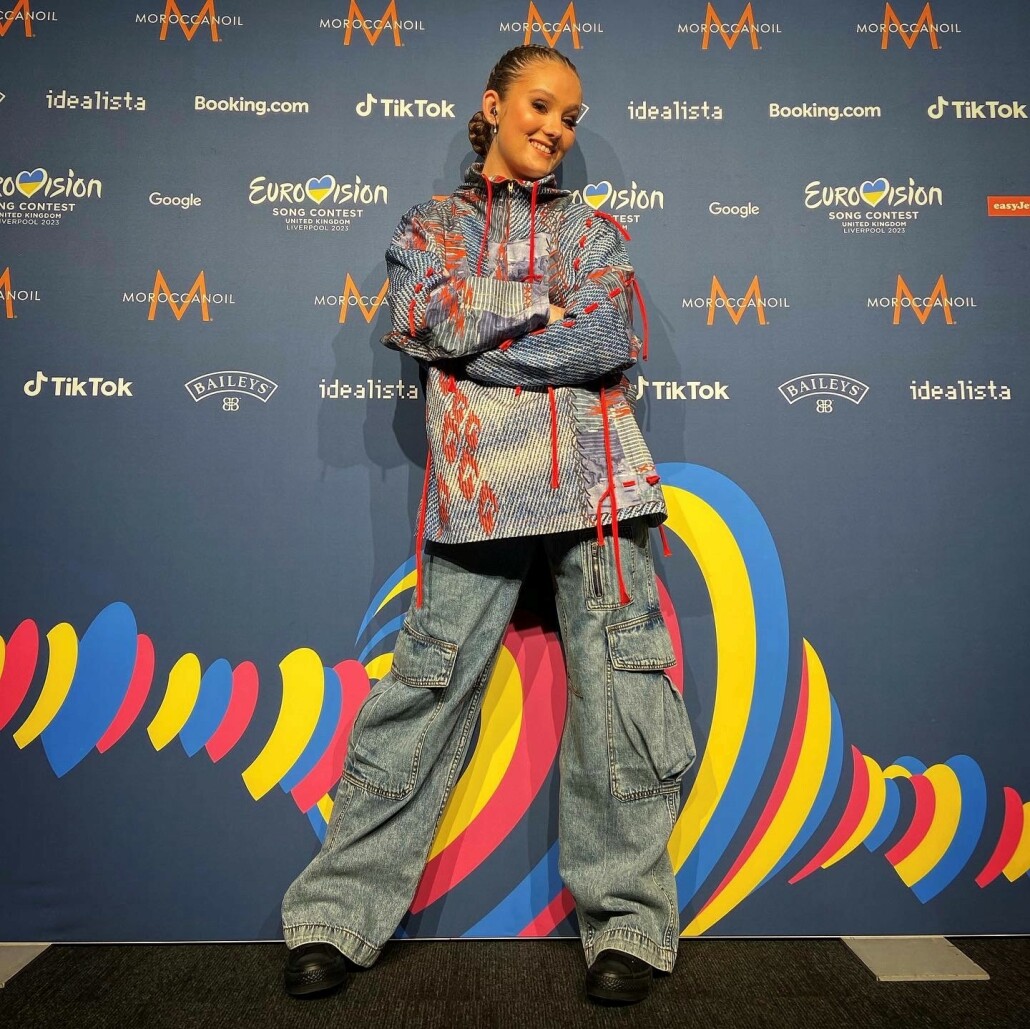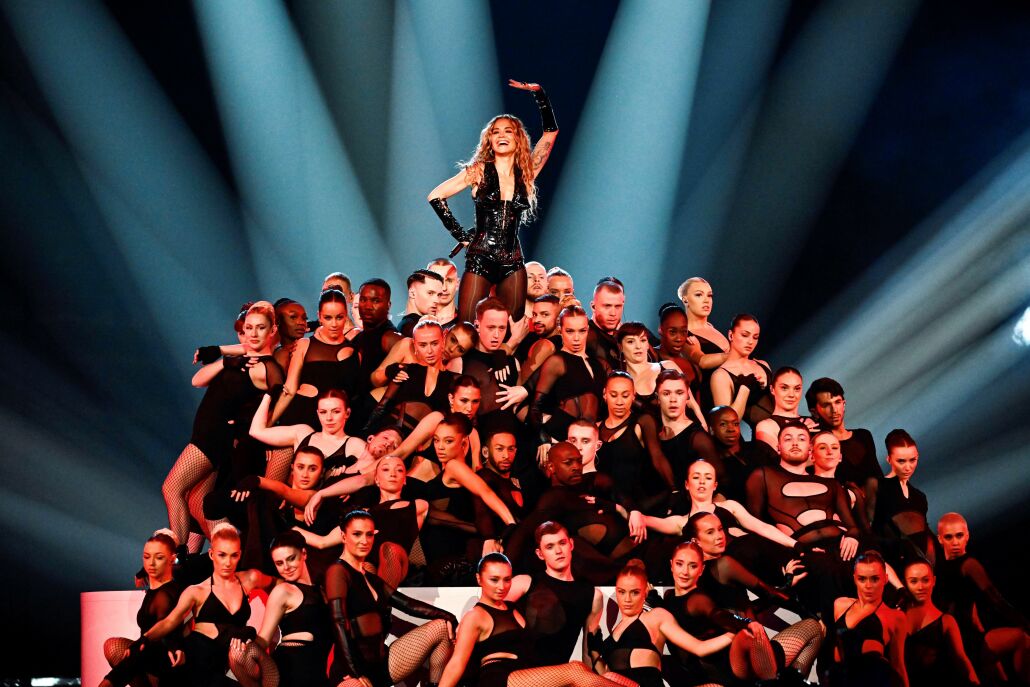LIPA dance graduate tells how performing with Eurovision stars on live TV kickstarted her Covid-hit career
- Mollie Scholes one of 45 LIPA dancers given Eurovision opportunity
- The 25-year-old danced with Rita Ora in front of millions of viewers
- Mollie: ‘I never imagined having a job like Eurovision – everyone was buzzing’
A LIPA dance graduate whose job prospects were hit by Covid has told how Eurovision kickstarted her career by giving her the chance to perform with top stars in front of millions of TV viewers.
Mollie Scholes, who completed a BA in Dance in 2020, was among more than 150 students and graduates from the Liverpool Institute of Performing Arts (LIPA) who landed roles linked to the iconic music contest and city-wide festival in May.

LIPA dance graduate Mollie Scholes
The 25-year-old, who came to study at LIPA from Manchester, performed on the main stage with interval acts including Rita Ora and Ukraine’s 2022 winners, Kalush Orchestra, during Eurovision’s two semi-finals and final.
She was part of a team that included 24 professional dancers and she worked with some of the world’s top choreographers.
Speaking as new reports reveal Eurovision’s massive boost to the Liverpool City Region, Mollie said:
“I never imagined having a job like Eurovision to be honest. Everyone was buzzing to get it – once in a lifetime, Eurovision in Liverpool.
“It was crazy to have so many people watching around the world. The adrenaline rush got me through the night of the final. I tried to take in every second of the experience, even when we were feeling drained during long rehearsals.
“We were so in awe to be working with the professional dancers and with the choreographers, Lukas McFarlane and Jason Gilkison. They have all had massive careers while for us this was the biggest thing we had ever done and maybe will do. I didn’t realise how much was involved until I started rehearsing in the main arena, how much was done for TV with camera angles and Steadicams on stage. It’s really interesting to see that side of things and work with pro dancers.
“I went in with quite an open mind and I learned a lot, especially how you hold yourself as a professional, how you present yourself in a room, being a smart dancer and taking on feedback. It is quite intense. With a job like that you just do your utmost. I think the professionals – who had two weeks longer than us to learn the material – were quite impressed with us. It is daunting but so exciting and the time flew by. Four weeks have never gone by so fast. It was an incredibly exciting experience.
“LIPA prepared us for all of this but you never know how you will deal with that situation – now I feel like I am ahead of the game. Knowing how to deal with such big choreographers and not getting star struck. There is a hierarchy and sometimes people can freeze. Hopefully working at such a professional level will help with other jobs, especially working with people like Lukas. Having their names on my CV will hopefully help with getting jobs and lead to other things.”

45 current and former LIPA dance degree students were involved in the Eurovision performances.
Mollie was in the final year of her degree in 2020 when Covid stuck and she ended up completing her studies remotely on Zoom and doing ballet classes in the kitchen or garden.
Luckily, her class had completed a third-year musical, Chicago, and a dance show based on the Fifth Element, both with full audiences but then “March came and everything went to pot”.
Mollie added:
“During the pandemic there was literally no work. I went from living on my own for three years to going back to live with my parents. It was really hard going until the industry picked up. I was offered a nine-month contract just before rehearsals started which would have allowed me to get paid to dance and travel around the world. I had to make a decision: it was one or the other, and I was desperate to go. Cruises might come and go but Eurovision in Liverpool and the chance to dance for Rita Ora was not an opportunity that was going to come around again.
“I am more the musical theatre end of things, and this was a commercial job, so I never thought I would do something like that.”
Prior to Eurovision, Mollie had performed in panto, a circus spectacular and a season dancing in different hotels in Crete. Since the show, she has landed a job with the TV series A Gentleman in Moscow, starring Ewan McGregor, and she hopes the experience will help her land more high-profile work.
Mollie told of her Eurovision experience as new figures reveal hosting the world-famous song contest attracted more than 300,000 extra visitors and delivered nearly £55m of economic benefits.
Sarah E. Baker, Head of Dance at LIPA, said:
“It was a phenomenal opportunity, performing in front of a live audience of tens of thousands of people and a TV audience of millions – they have not experienced that level of energy.
“It is really rare even as a professional to do something on that scale – it is the ultimate in professional experience whilst still in school, great to go on the CV and they got paid well for it.”
Following auditions with the choreography team led by Lukas McFarlane, famous for The X Factor’ and ITV’s The Voice, 45 current and former LIPA dance degree students were selected and split into two groups: as interval acts on the main stage and as stand-ins during technical rehearsals.
Working with professional dancers from company Motionhouse, they performed on the main arena stage and the live show at St George’s Hall, which included Liverpool pop legends Frankie Goes To Hollywood.
Dancers also took part in Daði Freyr’s cover of Atomic Kitten’s Whole Again during the final, forming a chorus line behind the Icelandic star, and as a flash mob for a Rita Ora video filmed in Liverpool.
Sarah added:
“They got to put into practice many of the things that they are studying – rehearsing with props, doing the tech (technical rehearsal) and following health and safety protocols – but on a grand scale. We teach them all that but to do this on such a professional level gives them an edge.
“These were intense rehearsals working with people in the profession – you just can’t not learn and grow from something like that. We have got no doubt that they will advance faster than if they had never had the chance.
“This is a portfolio career and experiences like this can keep dancers motivated through the tough times. The networking aspect of the Eurovision jobs is also likely to lead to more employment and connection within the professional industry.
“At LIPA we are lucky with our relationship with the BBC but this was by far the biggest opportunity we have had in my 15 years here. One of the really beautiful things was that the BBC allowed us to open it up to the graduates from Covid – who had a really rough go of it. To have this opportunity to do something that massive and having that experience on TV was just phenomenal.”
Latest News
Mayor launches ‘Merseyrail in Bloom’ initiative to make stations brighter, greener and more welcoming
Mayor announces £17m for first phase of new walking and cycling link for East Runcorn
Mayor unveils four-year blueprint for making the Liverpool City Region the best place to grow up, grow a family and grow a business
Mayor salutes city region’s ‘year of transformation’ as he eyes deeper devolution to ‘truly unleash potential’
Liverpool City Region Combined Authority to lead new regional Music Hub
